In an era of increasing concern for the planet’s well-being, environmental scientists play a crucial role in understanding and mitigating the impact of human activities on the environment. These dedicated professionals utilize their expertise to study, analyze, and develop solutions to pressing environmental challenges. By employing scientific methods and advanced tools, environmental scientists offer valuable insights that inform policy decisions, promote sustainable practices, and pave the way for a more harmonious coexistence between humans and nature.
The Role of Environmental Scientists
Environmental scientists are specialists who focus on studying and analyzing the complex interactions between humans and their surroundings. Their work encompasses various disciplines, including ecology, geology, chemistry, and biology. By studying natural ecosystems, pollution patterns, climate change, and resource management, they provide crucial information necessary for informed decision-making.
Understanding Human Impact
One of the primary objectives of environmental scientists is to comprehend the extent and consequences of human activities on the environment. They investigate pollution sources, deforestation, habitat destruction, and the depletion of natural resources. Through rigorous data collection and analysis, they quantify the impact and identify potential risks associated with human actions.
Research and Analysis Techniques
Environmental scientists employ a wide array of research methods and analysis techniques to assess the effects of human activities on the environment. They conduct field surveys, collect samples, monitor environmental indicators, and utilize advanced laboratory tools to analyze data. By studying long-term trends and patterns, they provide evidence-based insights into the changing dynamics of ecosystems and environmental health.
Environmental Modeling and Predictive Analysis
Environmental scientists also utilize sophisticated modeling tools and computer simulations to predict and project future environmental scenarios. These models consider factors such as population growth, land-use changes, and climate patterns to anticipate the potential consequences of human activities. Such predictive analysis helps policymakers and stakeholders make informed decisions and implement proactive measures.
Solutions and Mitigation Strategies
Beyond studying the problems, environmental scientists actively engage in developing solutions and mitigation strategies. They collaborate with policymakers, conservationists, and communities to devise sustainable practices that minimize negative environmental impacts. From advocating for renewable energy sources to promoting biodiversity conservation, their expertise contributes to a more sustainable and resilient future.
Policy Development and Advocacy
Environmental scientists often work closely with government agencies, non-profit organizations, and international bodies to shape policies that safeguard the environment. Through their research findings and expert opinions, they provide valuable insights into the potential consequences of specific policies and advocate for environmentally conscious approaches. Their work is instrumental in ensuring that environmental considerations are integrated into decision-making processes at all levels.
Conclusion
Environmental scientists are indispensable professionals who dedicate their careers to understanding and addressing the impact of human activities on the environment. Through their expertise in research, analysis, modeling, and advocacy, they help us comprehend the complex relationships between human actions and the natural world. By championing sustainable practices, developing mitigation strategies, and influencing policy decisions, environmental scientists play a pivotal role in preserving our planet for future generations. Their invaluable contributions are vital in fostering a harmonious coexistence between humanity and the environment.
